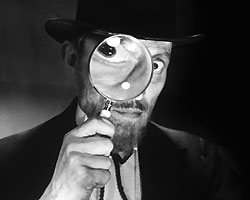Unwrapping a Wellesian mystery
 Criterion’s The Complete Mr. Arkadin (aka Confidential Report) 3-disc DVD package was released last Tuesday. I’ve spent three of the last five evenings with it, and I’m still not done. Criterion, responsible for the restoration and “rescuing” of so many fine films, really outdid itself this time. This set is not only a wonderful homage to the late Orson Welles, who wrote, directed, and starred in Mr. Arkadin, it is practically a “film school in a box.”
Criterion’s The Complete Mr. Arkadin (aka Confidential Report) 3-disc DVD package was released last Tuesday. I’ve spent three of the last five evenings with it, and I’m still not done. Criterion, responsible for the restoration and “rescuing” of so many fine films, really outdid itself this time. This set is not only a wonderful homage to the late Orson Welles, who wrote, directed, and starred in Mr. Arkadin, it is practically a “film school in a box.” As I posted last month, Mr. Arkadin may be the greatest of the many Orson Welles Puzzles. First of all, some half-dozen different edits of the 1955 thriller-noir exist (including two Spanish versions, which feature two different actresses from the English-language editions); Welles disowned all of them. Unfortunately, the director spoke very little about the movie, and there are no existing memos or notes that detail his original intent. As such, Mr. Arkadin has been the subject of heated debate while floating around art houses and college campuses in horrible disrepair for more than 40 years. Criterion has now fixed the “disrepair” problem. All three of the versions offered in this set — the 1955 European release (Confidential Report), the 1962 American release, and a 2006 “comprehensive version” stitched together by folks at the Munich Film Archives — are beautiful restorations. However, even Criterion can’t present a definitive Mr. Arkadin. We’ll never know for sure what Welles’ vision was for this movie (and that vision, it’s said, changed day to day for every one of his projects). But now, thanks to Criterion, we can sift through The Complete Mr. Arkadin and either pick a favorite version from those presented or mentally fashion our own “perfect edit” using the outtakes, rushes, and alternate scenes offered. I’m grateful for that.

The Complete Mr. Arkadin is top-notch. The set leaves no stone unturned. It includes a trade paperback of Welles’ novelization of the movie (and there are many unanswered questions about its authenticity), audio commentary, interviews with one of the film’s stars and several Welles buffs, three half-hour episodes of Welles’ 1951 BBC radio program The Lives of Harry Lime (which included components later used in Mr. Arkadin), and lots of other wonderful things. Fans of Orson Welles, cinematic oddities, and film noir should really not miss this.













0 Comments:
Post a Comment
<< Home